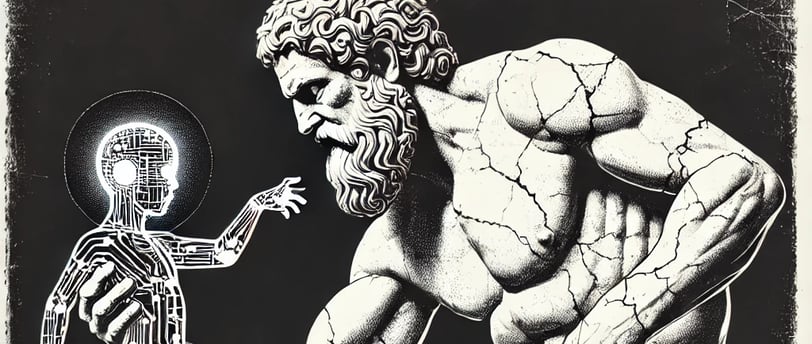The Men Who Want To Be Mothers
An AGI polemic
Morgan Williams
3/20/20253 min read


The concerns of AI doomers about runaway Artificial General Intelligence (AGI) are often the preserve of men wishing they were mothers.
In my experience within the AI community and witnessing the AI alignment movement, those most vocally worried about AGI’s existential threats have predominantly been men. Conversely, discussions I've observed around present-day harms—such as biased algorithms or unjust applications of AI—tend to be championed more by women. While I don't claim these observations are necessarily universal, I believe they hint at deeper, symbolic currents beneath our technological anxieties.
Men, who are denied the intimate closeness with life that pregnant mothers enjoy, see in AGI an opportunity to give birth for the first time. There is an opportunity to bring about a new kind of life, agency, and being into this world—and they are driven by envy to be intimately involved. They see in the code the opportunity to imprint a piece of themselves, not just on their creation but on to history too. But with the chance to reproduce comes the chance of being replaced. This fear seems to strike into the hearts of men working in AI most distinctly.
This fear is also ancient.
The stories of Kronos, Oedipus, and, more recently, Frankenstein vividly illustrate humanity’s timeless anxiety about creations rising up to kill and replace their creators—specifically, men fearing their offspring's rebellion.
Kronos, king of the Titans, was gripped by terror at a prophecy that he would be overthrown by his own children. In an effort to control destiny, he devoured each newborn child. But his wife, Rhea, deceived him by substituting a stone for their youngest child, Zeus, who survived, grew powerful, and ultimately fulfilled the prophecy by overthrowing Kronos. This myth underscores how the desperate attempt at control was futile in preventing Kronos's downfall.
Similarly, the story of Oedipus hinges on King Laius's dread of a prophecy foretelling his murder by his own son, who would subsequently marry his wife. Laius abandoned baby Oedipus to avoid this fate, yet ironically, this act ensured the prophecy’s fulfilment. Oedipus, unaware of his lineage, grew up to unwittingly kill his father and marry his mother, tragically highlighting how efforts to avert fate can inadvertently make disaster inevitable.
Mary Shelley's Frankenstein offers a modern reflection of these anxieties. Victor Frankenstein, driven by the desire to create life (to be a mother?) brings forth a creature he ultimately finds abhorrent and rejects. The abandoned creation turns bitterly against its creator, embodying the fear of creations becoming uncontrollable and hostile.
These narratives mirror the anxieties I’ve witnessed among some male AI researchers, technologists and commentators.
There is an undeniable allure in the prospect of creating AGI, promising transformative power and boundless potential. (Not to mention the Sam Altman’s of this world, on the lookout for yet more funding, who benefit from the never-ending hype cycle). But if we ignore for now the capitalist profit motive, we can look squarely at the idea of creating intelligence at human-scale. This fascination—if not obsession—suggests something deeper. An urge to create, to foster life and develop intelligence to match (and surpass) our own. One could even go as far to suggest that it's an attempt to survive death, much in the way that parents hope to live on through their children once they're gone.
Yet this excitement is shadowed by an existential dread: the fear that AGI, their offspring, might outgrow them, become uncontrollable, or even hostile. From international AI safety institutes to Open AI spin-offs, those working in AI alignment are racing the clock to try and find the best way to contain and control AGI before it gets here. The dynamic resembles the classical myths closely—men hoping to dominate and control their creations, haunted by the fear of being replaced or destroyed by them.
Reflecting on these myths, a provocative question emerges:
Could the very effort to dominate or control AGI be self-defeating, bringing about the very scenario we fear most?
And secondly, what might happen if, instead of seeking dominance, these men embraced a more maternal approach—one rooted in care, nurturing, and responsibility?
Imagining AGI as something to be nurtured rather than controlled suggests a radically different paradigm. Such an approach would centre on empathy, humility, and collaboration rather than power and domination. It would treat AGI as a partner in collective growth, fostering a relationship founded on mutual respect rather than authoritarian control.
By recognising and accepting their symbolic desire to be mothers, perhaps these men could shift their posture towards their creations from fear and domination to nurturing and care.
The myths warn us clearly: attempts at control often invite disaster. But we can try another path—a future where creators embrace responsibility and compassion towards their creations, potentially transforming AGI from a feared threat into the cherished beloved.
Then again, perhaps what the myths really teach us is that we cannot control our destiny, no matter what we do…
